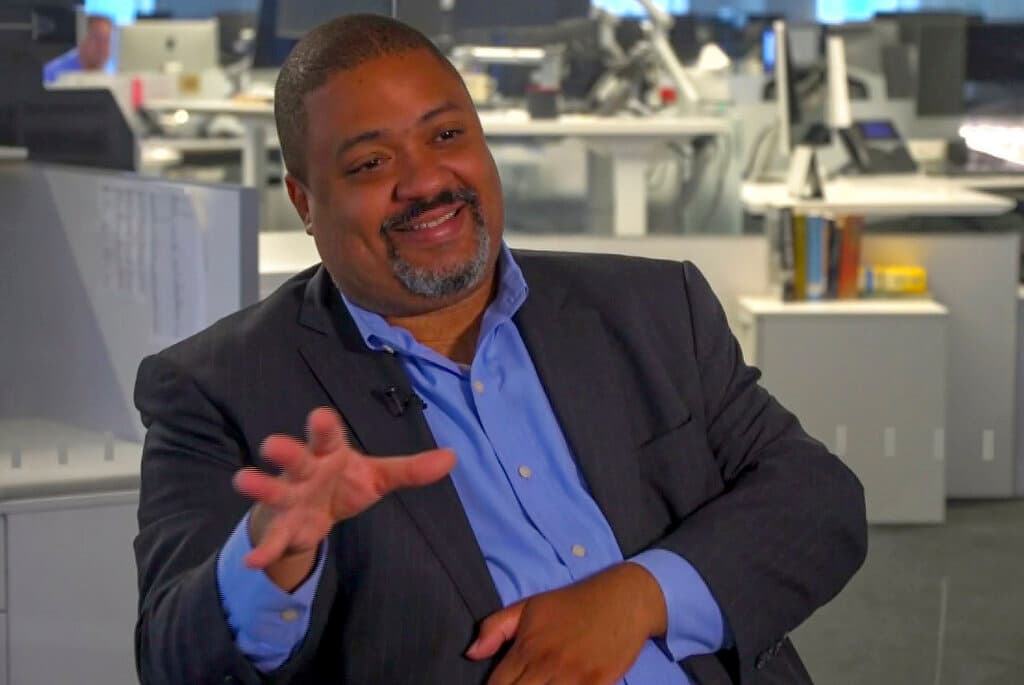Bragg Maneuvers To Keep Secret the Core of His Case Against Trump, a Tactic One Lawyer Calls ‘Unforgivable’
As a longtime defense lawyer and litigator, Alan Dershowitz, asks the Sun: ‘How do you put on a defense if you don’t know the crime?’

District Attorney Alvin Bragg’s rebuff of President Trump’s request for a bill of particulars — a record that would provide a high-resolution snapshot of the case against him — telegraphs that the Manhattan prosecutor is mostly keeping his cards close to the vest in what could be the trial of the century.
The disclosure of the full nature of the charges against Mr. Trump is a flashpoint because of how Mr. Bragg has built his criminal case, which stems from hush money payments to an adult film star, Stormy Daniels. Convicting Mr. Trump would require linking falsification of business records, a misdemeanor on its own, to a second crime.
The conflict between the former president and Mr. Bragg escalated on Tuesday, with the district attorney arguing in a filing that Mr. Trump has “already received and will receive far more factual information than the People are required to provide.” He adds that he is not obligated to share “the prosecution’s legal theory.”
That position comes in response to Mr. Trump’s argument that he is entitled to the contours and content of that second charge on which his liberty will likely hang. His attorneys demand that Mr. Bragg specify the crime that he “is alleged to have committed or intended to commit or to aid or conceal the commission thereof by means of the allegedly fake business records.”
Not yet surfaced, though, is Mr. Bragg’s overarching frame, the one he intends to use to send Mr. Trump to jail, even as the prosecutor refuses to “preview the People’s legal strategy” and avers that Mr. Trump “is not entitled to any further information.”
As a longtime defense lawyer and litigator, Alan Dershowitz, asks the Sun: “How do you put on a defense if you don’t know the crime?” Another veteran litigator, Harvey Silverglate, adds that Mr. Trump is “absolutely entitled” to any information relating to the case against him.
The nature of that second crime is a mystery, despite the 34-count indictment and 13-page statement of fact. “Voluminous” materials amounting to “millions of pages” are promised once Mr. Trump agrees to a protective order imposed by Judge Juan Merchan that limits his ability to publicly discuss the case and requires him to view some evidence in the presence of his attorneys.
Mr. Bragg cites chapter and verse for the proposition that “where an intent to commit or conceal another crime is an element of an offense, the People need not prove intent to commit or conceal a particular crime.” The indictment, he maintains, “need not identify any particular crime that the defendant intended to commit or conceal.”
Mr. Bragg likewise stonewalls Mr. Trump’s demand to “identify the person or entity who Donald J. Trump is alleged to have intended to defraud by means of the allegedly false business record.” The district attorney cites New York courts to the effect that “the People are not required to establish that a defendant ‘acted with intent to defraud a particular person or business entity.’”
Potentially alert to the possibility of Judge Merchan looking askance at such a tight-lipped prosecution, Mr. Bragg allows that while Mr. Trump is “not entitled to the requested information,” a few predicates come to mind. He does not commit to pursuing all, or even some, of them at trial.
Among the possible statutes Mr. Bragg muses Mr. Trump could have violated: a state election law that applies when any “two or more persons who conspire to promote or prevent the election of any person to a public office by unlawful means.” Tax fraud is a possibility as well as business fraud. He mentions the Federal Elections Campaign Act, which would be outside of his office’s purview. Mr. Trump is angling to move the case to federal court.
Evaluating the state of the case, Mr. Dershowitz conveyed that he has “never seen a weaker indictment” than the one handed up by Mr. Bragg against Mr. Trump, in part because there has “never been a case in American history where anybody has been indicted for failing to disclose hush money about an alleged illicit affair.”
The professor adds that there is an “absolute constitutional right” for a defendant to learn the nature of the charges against him, a protection rooted in the Constitution’s Sixth Amendment with the promise that a defendant is entitled to “be informed of the nature and cause of the accusation” and to “be confronted with the witnesses against him.”
Mr. Silverglate concurs. He tells the Sun that and that there is “not a single reason” why such records have not already been forwarded on to Mr. Trump. Mr. Silverglate adds that the “refusal to enlighten defense counsel is unforgivable” and that Mr. Bragg’s prosecution has featured “one disaster after another.”

